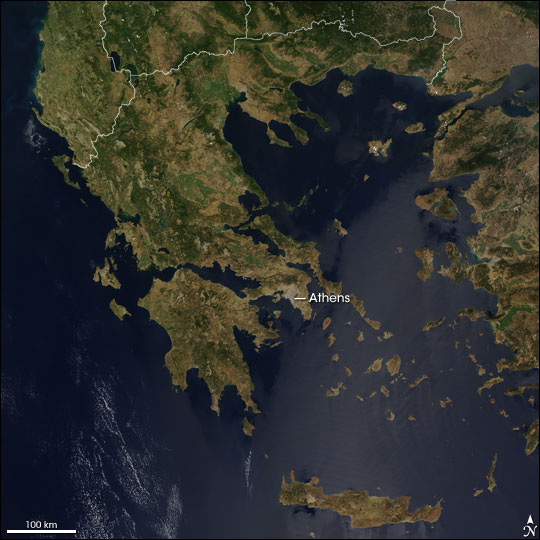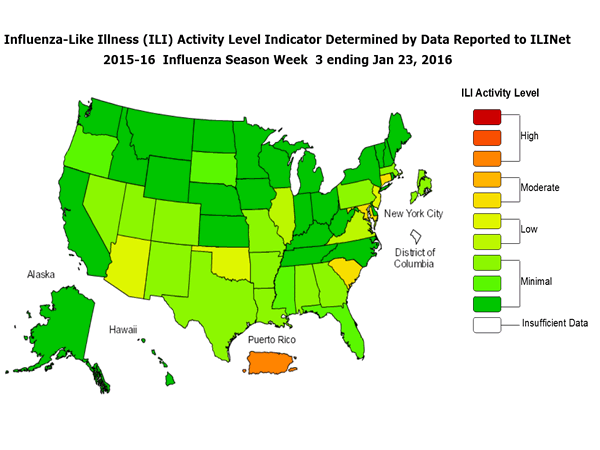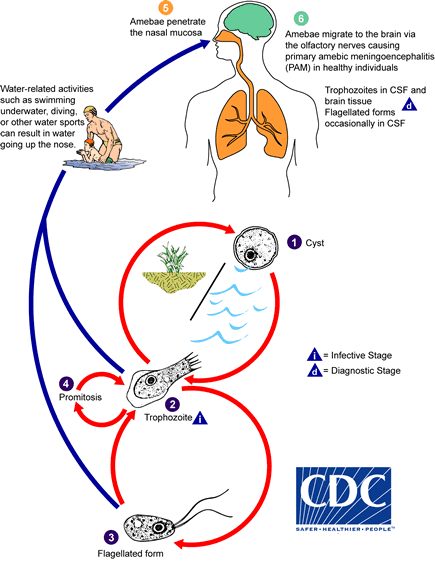Archive for January, 2016
Nigeria: At least 65 people were killed during an attack by Boko Haram near Maiduguri
Sunday, January 31st, 2016ISIS bombers kill more than 60 people near Syria’s holiest Shi’ite shrine.
Sunday, January 31st, 2016** The Interior Ministry blamed the attacks on a car bomb and two suicide bombers
** The civil war has also killed over 250,000 people and driven more than 10 million from their homes
About 40 migrants drown (75 rescued) after their boat sinks off Turkey’s western coast
Sunday, January 31st, 2016Weekly U.S. Influenza Surveillance Report
Sunday, January 31st, 2016During week 3 (January 17-23, 2016), influenza activity increased slightly in the United States.
- Viral Surveillance: The most frequently identified influenza virus type reported by public health laboratories during week 3 was influenza A, with influenza A (H1N1)pdm09 viruses predominating. The percentage of respiratory specimens testing positive for influenza in clinical laboratories increased.
<!–
- Novel Influenza A Virus: One human infection with a novel influenza A virus was reported.
–>
- Pneumonia and Influenza Mortality: The proportion of deaths attributed to pneumonia and influenza (P&I) was below their system-specific epidemic threshold in both the NCHS Mortality Surveillance System and the 122 Cities Mortality Reporting System.
- Influenza-associated Pediatric Deaths: No influenza-associated pediatric deaths were reported.
- Influenza-associated Hospitalizations: A cumulative rate for the season of 2.1 laboratory-confirmed influenza-associated hospitalizations per 100,000 population was reported.
- Outpatient Illness Surveillance: The proportion of outpatient visits for influenza-like illness (ILI) was 2.2%, which is above the national baseline of 2.1%. Six of 10 regions reported ILI at or above region-specific baseline levels. Puerto Rico experienced high ILI activity; three states experienced moderate ILI activity; five states experienced low ILI activity; New York City and 42 states experienced minimal ILI activity; and the District of Columbia had insufficient data.
- Geographic Spread of Influenza: The geographic spread of influenza in four states was reported as widespread; Puerto Rico and 14 states reported regional activity; Guam and 12 states reported local activity; and the District of Columbia, the U.S. Virgin Islands and 20 states reported sporadic activity.
Pakistan: Last year, the 51 cases of wild poliovirus represented the bulk of all 70 cases reported throughout the world. 2014’s count was 294 cases.
Saturday, January 30th, 2016Why success?
** “…..The WHO has been lambasted in the past couple of years by scientists, aid organizations, and public health experts for the slow way in which it initially reacted to the Ebola epidemic as it spread across West Africa in 2014. And so far, the hesitant response to the Zika outbreak…..says much about the difficulties that the WHO and other health authorities face in combating unexpected public health threats……”
Saturday, January 30th, 2016** ‘……..”We knew this was something else,” says Carlos Brito, a doctor from Recife who told state and federal health authorities in January-February [2014] that they were wrong to classify all the cases as dengue. “But the authorities were slow to believe,” he said…..’
** “….a group of doctors discussing the odd symptoms in text messages – grew frustrated with the authorities’ narrow focus…..”
** “…It took until early May for the health ministry to recognize that the Zika virus had arrived in Brazil and to alert the…..Pan American Health Organization. ….”
** “…And it wasn’t until November that a Rio de Janeiro laboratory made a link between the virus and microcephaly….”

** ‘…”My chief criticism is of WHO in Geneva. After being widely condemned for acting late on Ebola, it is now sitting back with Zika,” said Lawrence O. Gostin, a professor of public health law at Georgetown University…..’

The WHO’s International Health Regulations Emergency Committee will meet on Monday 1 February in Geneva to ascertain whether the Zika Virus outbreak constitutes a Public Health Emergency of International Concern.
Friday, January 29th, 2016WHO’s Regional Office for the Americas (PAHO) has been working closely with affected countries since May 2015. PAHO has mobilized staff and members of the Global Outbreak and Response Network (GOARN) to assist ministries of health in strengthening their abilities to detect the arrival and circulation of Zika virus through laboratory testing and rapid reporting. The aim has been to ensure accurate clinical diagnosis and treatment for patients, to track the spread of the virus and the mosquito that carries it, and to promote prevention, especially through mosquito control.
The Organization is supporting the scaling up and strengthening of surveillance systems in countries that have reported cases of Zika and of microcephaly and other neurological conditions that may be associated with the virus. Surveillance is also being heightened in countries to which the virus may spread. In the coming weeks, the Organization will convene experts to address critical gaps in scientific knowledge about the virus and its potential effects on fetuses, children and adults.
WHO will also prioritize the development of vaccines and new tools to control mosquito populations, as well as improving diagnostic tests.
PAHO Director’s Statement on Zika Virus in the Americas at the 138th WHO Executive Board
ISIS militants claimed responsibility for a suicide car bombing that killed at least 11 people Thursday outside the Presidential palace
Friday, January 29th, 2016If Europe isn’t going to welcome more than 1 million people a year, it will have to deport large numbers of them to countries plagued by social unrest and abject poverty.
Friday, January 29th, 2016** Sweden could send back 60,000-80,000 asylum seekers in the coming years.
** Under U.N. rules, countries are supposed to offer protection to refugees fleeing war and persecution. But some European countries also offer protection to people deemed at risk of torture or the death penalty or who are suffering from an exceptionally serious disease.





